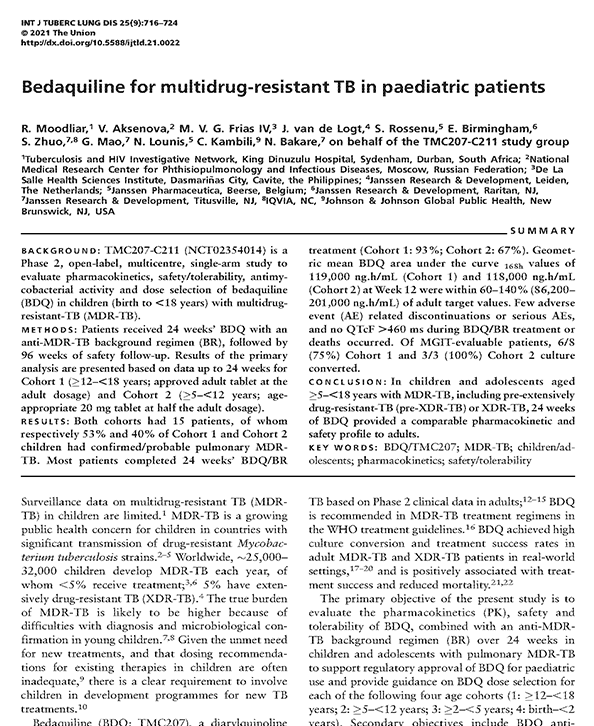Date: 1 September 2021
Authors: Moodliar, R. 1 ; Aksenova, V. 2 ; Frias, M. V. G. 3 ; van de Logt, J. 4 ; Rossenu, S. 5 ; Birmingham, E. 6 ; Zhuo, S. 7 ; Mao, G. 8 ; Lounis, N. 5 ; Kambili, C. 9 ; Bakare, N. 8 ; on behalf of the TMC207-C211 study group
Source: The International Journal of Tuberculosis and Lung Disease, Volume 25, Number 9, 1 September 2021, pp. 716-724(9)
Publisher: International Union Against Tuberculosis and Lung Disease
ABSTRACT:
BACKGROUND: TMC207-C211 (NCT02354014) is a Phase 2, open-label, multicentre, single-arm study to evaluate pharmacokinetics, safety/tolerability, antimycobacterial activity and dose selection of bedaquiline (BDQ) in children (birth to <18 years) with multidrug-resistant-TB (MDR-TB).
METHODS: Patients received 24 weeks’ BDQ with an anti-MDR-TB background regimen (BR), followed by 96 weeks of safety follow-up. Results of the primary analysis are presented based on data up to 24 weeks for Cohort 1 (≥12–<18 years; approved adult tablet at the adult dosage) and Cohort 2 (≥5–<12 years; age-appropriate 20 mg tablet at half the adult dosage).
RESULTS: Both cohorts had 15 patients, of whom respectively 53% and 40% of Cohort 1 and Cohort 2 children had confirmed/probable pulmonary MDR-TB. Most patients completed 24 weeks´ BDQ/BR treatment (Cohort 1: 93%; Cohort 2: 67%). Geometric mean BDQ area under the curve 168h values of 119,000 ng.h/mL (Cohort 1) and 118,000 ng.h/mL (Cohort 2) at Week 12 were within 60–140% (86,200–201,000 ng.h/mL) of adult target values. Few adverse event (AE) related discontinuations or serious AEs, and no QTcF >460 ms during BDQ/BR treatment or deaths occurred. Of MGIT-evaluable patients, 6/8 (75%) Cohort 1 and 3/3 (100%) Cohort 2 culture converted.
CONCLUSION: In children and adolescents aged ≥5–<18 years with MDR-TB, including pre-extensively drug-resistant-TB (pre-XDR-TB) or XDR-TB, 24 weeks of BDQ provided a comparable pharmacokinetic and safety profile to adults.
Keywords: BDQ/TMC207; MDR-TB; children/adolescents; pharmacokinetics; safety/
Affiliations: 1: Tuberculosis and HIV Investigative Network, King Dinuzulu Hospital, Sydenham, Durban, South Africa 2: National Medical Research Center for Phthisiopulmonology and Infectious Diseases, Moscow, Russian Federation 3: De La Salle Health Sciences Institute, Dasmariñas City, Cavite, the Philippines 4: Janssen Research & Development, Leiden, The Netherlands 5: Janssen Pharmaceutica, Beerse, Belgium 6: Janssen Research & Development, Raritan, NJ 7: Janssen Research & Development, Titusville, NJ, IQVIA, NC 8: Janssen Research & Development, Titusville, NJ 9: Johnson & Johnson Global Public Health, New Brunswick, NJ, USA

